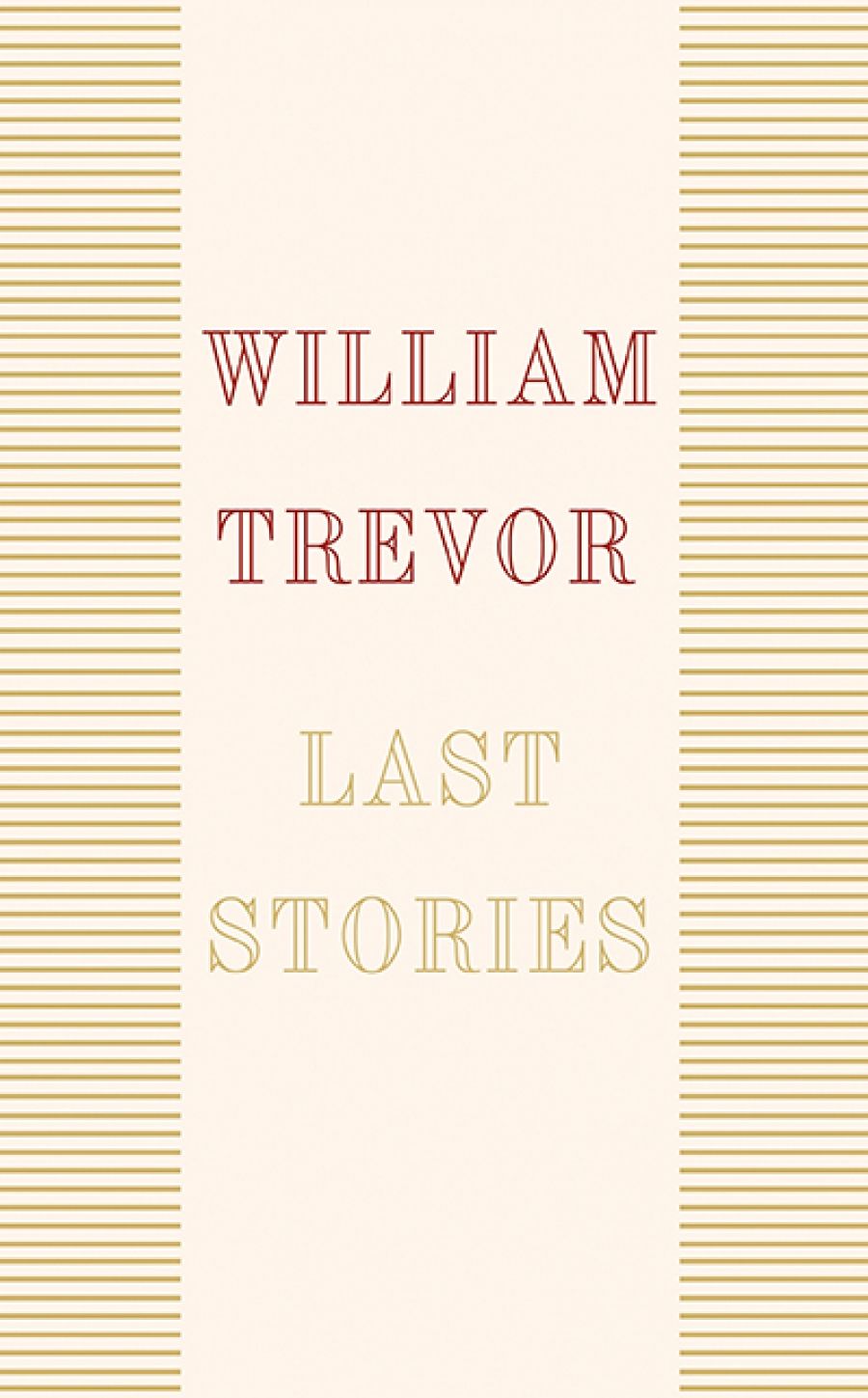
- Free Article: No
- Contents Category: Fiction
- Custom Article Title: Geordie Williamson reviews 'Last Stories' by William Trevor
- Review Article: Yes
- Online Only: No
- Custom Highlight Text:
‘In nearly all Trevor’s stories,’ wrote V.S. Pritchett almost four decades ago, ‘we are led on at first by plain unpretending words about things done to prosaic people; then comes this explosion of conscience, the assertion of will which in some cases may lead to hallucination and madness.’ Even here, in this collection ...
- Book 1 Title: Last Stories
- Book 1 Biblio: Viking, $29.95 pb, 214 pp, 9780241337776
Still, there is so much more trembling at the edges of the story. The crippled old man is not in full charge of the moneys with which he intends to pay the painters. The painters aren’t Polish, as they claim to be. And the middle-aged woman who lives in the house, caring for her distant cousin on the understanding that his house and land will become hers on his death, has lost patience with her ward.
And yet Trevor’s approach is, as always, implicative as opposed to revelatory. We cannot know what moves the woman to act. We don’t even know what it is she’s done; only that, at a certain point over the coming weeks, the old man disappears from his home. Instead, readers are sent to follow the two painters, brothers and undocumented migrants from a forgotten corner of Eastern Europe, and witness what they may over their shoulders as the task is done:
Once, through the grimy panes of an upstairs window, the younger brother saw the woman crouched over a dressing table, her head on her arms as if she slept, or wept. She looked up while he still watched, his curiosity beyond restraint, and her eyes stared back at him but she did not avert her gaze.
This is realism, in the sense that authorial intelligence or knowledge is restrained by the shape of the character inhabited, by that necessarily limited perspective on the world. There is no mythic reverberation or overt symbolism, no easy leap into some godlike position to resolve some mystery or other. Just stories regarding individual human privacies – whether good, evil, or banal – glimpsed or overheard by others in partial form.
In ‘Mrs Crasthorpe’, the perspective of a newly minted widow is cross-hatched with that of a man, living in the same London streets, who loses his wife to some awful disease. Where he is gentle, reserved, sealed up in his grief, she is keen to escape the memory of a boring if financially secure marriage, and once again engage with the sensual world. We have no idea what Etheridge – to give the man his name – looks like until brassy Mrs Crasthorpe happens across him one day in the street. Their meetings in the months that follow are brief and unintended (especially on Etheridge’s part), but he does see her from the window of a restaurant during a work lunch one final time. She is involved in an altercation with a younger man, one that ends in his being removed by police in handcuffs. Etheridge thinks little of it until, sometime later, he reads of the discovery of her dead body. We readers know that the altercation involved her son by an earlier relationship, a man who became a recidivist convict and a spiteful creature. We know because this acutely class-conscious woman visited him regularly, against his wishes and against the grain of her snobbery, in prison.
Etheridge knows nothing of this: he only knows she was pushy and forward, a woman who could have been like him (in their mutual grief), but was not. He avoided her but couldn’t help feeling a pang of remorse at news of her sad end. It is only in death – far too late to make amends – that he returns to their shared ground and does some sleuthing: ‘Etheridge guessed his way through the mystery of Mrs Crasthorpe, but too much was missing and he resisted further speculation. He sensed his own pity, not knowing why it was there. He honoured a tiresome woman’s secret and saw that it was kept.’
If pressed to explain the low-key magnificence of William Trevor – the reason why he was so fêted and for so long; the reason why his reputation as one of the great short story writers of the twentieth and twenty-first centuries remains so durable – it would reside in a closing sentence such as this. Like Chekhov – and like Victor Sawdon Pritchett, his great English predecessor – Trevor weighed the entire universe on a modest set of kitchen scales: the very best and the very worst of what people are capable lay in his purview; he did not place so much as a thumb to tip these.
While he may be regarded as a superb novelist and novella writer (his short long fiction ‘Reading Turgenev’ must be included in any round-up of the best novellas of our era), the short story remains the ideal pitch for his aesthetic action. It is here that the kind of glancing insight which is nothing and everything at once may be generated: only the fragment can, as German Philosopher Peter Sloterdijk suggest, meet such demands: ‘Fragments, cripples and hybrids formulate something that cannot be conveyed by the common whole forms and happy integrities; intensity beats standard perfection.’


Comments powered by CComment